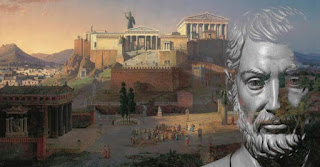 |
| Double Herm of Thucydides and Herodotus Thucydides was a historian of the wars between Athens and Sparta, in which he championed the Athenian general Perikles. Herodotus travelled and wrote widely and tried to be more impartial. |
Posted by Keith Tidman
Are historians obliged to be unwaveringly objective in their telling of the past? After all, as Hegel asserted: ‘People and government never have learned anything from history or acted on principles deduced from it’.
History seems to be something more than just stirring fable, yet less than incontestable reality. Do historians’ accounts live up to the tall order of accurately informing and properly influencing the present and future? Certainly, history is not exempt from human frailty. And we do seem ‘condemned’ to repeat some version of even half-remembered history, such as stumbling repeatedly into unsustainable, unwinnable wars.
In broad terms, history has an ambitious task: to recount all of human activity — ideological, political, institutional, social, cultural, philosophical, judicial, intellectual, religious, economic, military, scientific, technological and familial. Cicero, who honoured Herodotus with the title ‘the father of history’, seems to have had such a lofty role in mind for the discipline when he pondered: ‘What is the worth of human life, unless it is woven into the life of our ancestors by the records of history?’ The vast scope of that task implies both great challenges and vulnerabilities.
History provides the landscape of past events, situations, changes, people, decisions, and actions. Both the big picture and the subtler details of the historical record spur deliberation, and help render what we hope are wise choices about society’s current and future direction. How ‘wise’ such choices are — and the extent to which they are soundly based on, or at at least influenced by, how historians parse and interpret the past — reflects how ‘wise’ the historians are in fulfilment of the task. At its best, the recounting of history tracks the ebb and flow of changes in transparent ways, taking into account context for those moments in time. A pitfall to avoid, however, is tilting conclusions by superimposing on the past the knowledge and beliefs we hold today.
To these ends, historians and consumers of history strive to measure the evidence, complexities, inconsistencies, conflicts, and selective interpretations of past events. The challenge of chronicling and interpretation is made harder by the many alternative paths along which events might have unfolded, riven by changes in direction. There is no single linear progression or trajectory to history, extending expediently from the past to the present; twists and turn abound. The resulting tenuousness of causes and effects, and the fact that accounts of history and human affairs might not always align with one another, influence what we believe and how we behave generations later.
The fact is, historical interpretations pile up, one upon another, as time passes. These coagulating layers can only make the picture of the past murkier. To recognise and skilfully scrape away the buildup of past interpretations, whether biased or context-bound or a result of history’s confounding ebb and flow, becomes a monumental undertaking. Indeed, it may never fully happen, as the task of cleaning up history is less alluring feature than capturing and recounting history.
Up to a point, it aids accuracy that historians may turn to primary, or original, sources of past happenings. These sources may be judged on their own merits: to assess evidence and widely differing interpretations, assess credibility and ferret out personal agendas, and assess the relative importance of observations to the true fabric of history. Artifacts, icons, and monuments tell a story, too, filling in the gaps of written and oral accounts. Such histories are intended to endure, leading us to insights into how the rhythms of social, reformist, and cultural forces brought society to where it is today.
And yet, contemporaneous chroniclers of events also fall victim to errors of commission and omission. It’s hard for history to be unimpeachably neutral in re-creating themes in human endeavour, like the victories and letdowns of ideological movements, leaders, governments, economic systems, religions, and cultures, as well as of course the imposing, disruptive succession of wars and revolutions. In the worst of instances, historians are the voice of powerful elites seeking to champion their own interests.
When the past is presented to us, many questions remain. Whose voice is allowed to be loudest in the recounting and interpretation? Is it that of the conquerors, elites, powerful, holders of wealth, well-represented, wielders of authority, patrons? And is the softest or silenced voice only that of the conquered, weak, disregarded, disenfranchised, including marginalised groups based on race or gender? To get beyond fable, where is human agency truly allowed to flourish unfettered?
Therein lies the historian’s moral test. A history that is only partial and selective risks cementing in the privileges of the elite and the disadvantages of the silenced. ‘Revisionism’ in the best sense of the word is a noble task, aimed at putting flawed historical storytelling right, so that society can indeed then ‘act on the principles deduced from it’.
